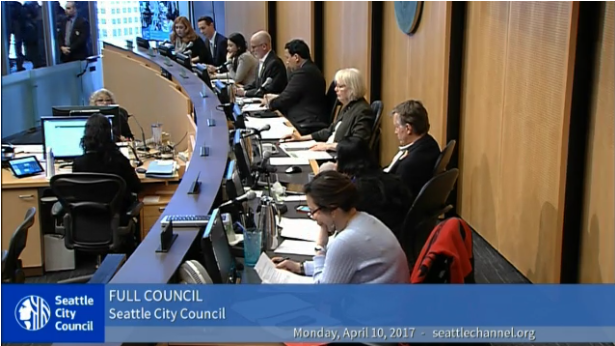Now that long-time councilmember Tim Burgess has ascended to the Mayor’s seat, vacating his lame-duck council seat for a brief chance at the city’s highest office, Seattle not only has its third mayor this year, it also needs to replace Burgess on the Council. You’d be forgiven for tiring of this game of musical chairs in city hall, but time is short–the new mayor is due to submit his 2019-2020 budget this Monday, September 25.
The budget is expected to exceed $5 billion for two years, funding crucial public services and infrastructure projects to support a rapidly growing city, and a new interim councilmember may play a decisive role in determining the final budget over the next two months, which will be passed before newly elected council members take office later this year.
Unless the council votes to appoint someone in the short term, the city has up to 20 days to consider applications for the vacant seat and hear public comment. A coalition calling itself “Transparent Seattle” has started a petition for the city to ensure the process of selecting a council member is transparent and inclusive. While the city has urgent business to attend to and cannot afford to delay for long, Seattle’s future should not be rushed. It is worth taking the time to ensure we get it right.
The budget is a critical piece of biennial legislation, helping shape and guide the future of Seattle. One Center City and other crucial transit and infrastructure upgrades could be influenced by the budget, as are the direction of public education, police reform and housing policy affecting homeless sweeps, displacement and affordable housing. The lame-duck council may even have opportunity to approve alley vacations for the Washington State Convention Center (WSCC) Addition whether or not the public benefits package is large enough.
One looming project that Mayor Burgess may attempt to revive is the dormant North Precinct project, dubbed by community activists as “The Bunker” due to its imposing design and astronomic budget. Construction of The Bunker was delayed just over a year ago, after mounting community pressure decried its role in the militarization of a police department already under review for excessive use of force, as well as budget hawks skeptical of a record-setting $149 million price tag–money that could be used on other urgent priorities. However, many city hall watchers suspect Burgess, himself a former SPD officer, may make another attempt to push through funding for the North Precinct now that he has relatively little to lose in his political career. The council should side with the broad public opposition and reject another attempt at building the North Precinct, which will serve as a waste of time and resources needed for more critical problems facing Seattle.
We must learn from the past, even as we turn toward the future. Burgess, one of the longest-serving members of the Council, was on his way toward retirement even before his mayoral appointment. He was consistently one of the more conservative votes on the council. Both of his potential successors in November, Jon Grant and Teresa Mosqueda, are likely to consistently vote to his left. In order to ensure a smooth budgetary transition, the Council should prioritize a transparent public appointment process to ensure democratic community input on the interim council appointment before the Grant/Mosqueda election.
Ensuring adequate time and transparency to make this appointment would give the public time to process what has happened in our city in recent months, while creating space for communities to share their voice in who will represent their city as the council determines a critical budget that will shape the future of our city.
You can sign a petition from the group Transparent Seattle urging deliberation and inclusiveness in appointing Burgess’ replacement here. Follow Transparent Seattle on Twitter using the hashtag #TransparenSEA.
David Golightly is a musician, artist, and software developer advocating for cities that work for everyone.


